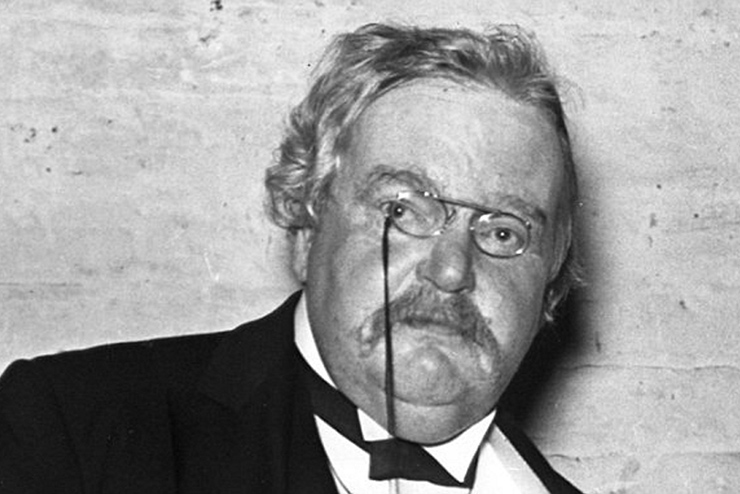After a trip to the United States in 1931, the great G.K. Chesterton (great in both form and matter) penned an essay entitled, “The Cowardice of Cocktails and Other Things.” Hardly an enemy of the Drink, Chesterton comes down rather hard on what was then being called the Cocktail Habit. Why?
For two reasons: the cocktail’s origins and its use. The cocktail started, Chesterton charges, during Prohibition because of husbands who were too pusillanimous to drink in front of their wives but who needed a stiff one to sit down with them for dinner. These uxorious milksops wished to consume something in secret that “could be gulped down quickly” and that ideally would be “very strong for its size.” Hence was born the early evening cocktail and the hasty Happy Hour.
Which brings us to GK’s second beef against the cocktail: its use as an aperitif before dinner. Chesterton, whose own appetite was as keen as his wit, finds the use of alcohol as a stimulant for hunger absurd. “I never yet needed a tot of rum,” he writes, “to help me go over the top and face the mortal perils of luncheon.” It is one thing to need an anesthetic to face pain, but “what are we to say of those who have to take an anesthetic before they can face pleasure?”
Chesterton’s conclusion: “The Cocktail Habit is to be condemned, not because it is American or alcoholic … but because it is … a worse way of drinking; more hasty, less healthy, even less desirable to anybody left to the honest expression of his own desires … It is rudimentary human nature that it is more natural to sit still and talk, and even drink, after dinner, than to stand up and gulp before dinner.”
Is there any hope for those of us who love both Chesterton and cocktails, or must we choose one and reject the other? I, for one, intend to continue having my cake and drinking it too.
First, while it is true that the cocktail got a tremendous boost from the 18th Amendment—largely as a way of masking the inferior quality of available liquor—it is false to state that cocktails are “the only practical product of Prohibition” and that they are the product of henpecked husbands to boot. Apparently Chesterton didn’t know that the world’s first cocktail, the Sazerac, was invented in the mid-19th century, or that the first cocktail party was supposedly thrown almost three years before Prohibition—and by a housewife rather than her husband. And if Chesterton had ever sipped a Last Word, he would have never, ever described a cocktail as something to be “gulped.”
Second, to evade the ire of Chesterton, one can simply avoid the bad habits he says are part of the Cocktail Habit. I certainly shall not stand and gulp my drink; I shall not use it to steel my courage for dinner (though I still may use it then out of sheer joy); and, if Chesterton insists, I shall happily incorporate the cocktail into my postprandial merriment as I sit still and talk with friends after the last course has been served. Most of all, I vow never to hide my enjoyment of potent potables from my wife but magnanimously share them with her.
For all his criticism, Chesterton cannot resist complimenting the cocktail when he observes that its rise has created “a sort of separate science of luxury in itself,” a fact that is easily observed today in what some are calling the “Second Golden Age of Drinking.” To mixology, then: the science of luxury!

Leave a Reply